#Literary Moments
Explore tagged Tumblr posts
Text


‘𝙏𝙝𝙚 𝙣𝙞𝙜𝙝𝙩 𝙞𝙨 𝙖 𝙘𝙖𝙣𝙫𝙖𝙨 𝙬𝙝𝙚𝙧𝙚 𝙙𝙧𝙚𝙖𝙢𝙨 𝙖𝙧𝙚 𝙥𝙖𝙞𝙣𝙩𝙚𝙙 𝙞𝙣 𝙩𝙬𝙞𝙡𝙞𝙜𝙝𝙩 𝙝𝙪𝙚𝙨.’ — 𝙐𝙣𝙠𝙣𝙤𝙬𝙣 🌌
#summer nights#twilight magic#night owl#literary moments#instapic#visuals#digital photography#photographer#photo daily#magical realism#artist#nature photography#fujifilm#fujifilmxt200#summer skies#silhouette shots#work in progress#evening glow#self portrait#self portraiture#late night work#night photography#dreamy skies
1 note
·
View note
Text
Audiobook Appreciation Month: A Brief Audiobook History
1932: A Jumpstart, and LPs The start of audibooks may date back to 1877 when Edison invented the phonograph with Graham Bell improving the device. Yet, the technology wasn’t quite to where it needed to be. The recordings were sold on cylinders and were often short-spoken recordings with 15 minutes worth of audio on either side. It wasn’t until 1932 to 1935 when talking book technology truly got…
View On WordPress
#Academic Reading#Audiobook Appreciation#Audiobook Appreciation Month#audiobooks#Blind#Blind Readers#Blog#Books#Canadian#Dsylexia#Dsylexic Readers#Encourage Reading#Fiction#Graham Bell#Literary#Literary Blog#Literary Day#Literary Figures#Literary Moments#Literary Month#Literature#LP#LPs#Narrated books#narrated stories#Narrated Textbooks#Readers#Reading#Reading Addict#Reading Addiction
0 notes
Text

Dinner in Paris.
1 note
·
View note
Text
yall i just KEEP doing back to mizu and taigen's wrestling scene in master eiji's forge and like i know that taigen literally got a boner from it BUT THE THING IS out of all the scenes these two have together, this scene actually has the least sexual tension ?!? cuz like the boner aside, this scene is actually very soft and emotions-driven rather than pure passion or lust.
arguably, a more passionate and sexually-charged scene would be their previous brawl in the snow with the chopsticks, which is tense and angry and also the scene that mizu thinks about when madame kaji talks about being honest with one's innermost desires.
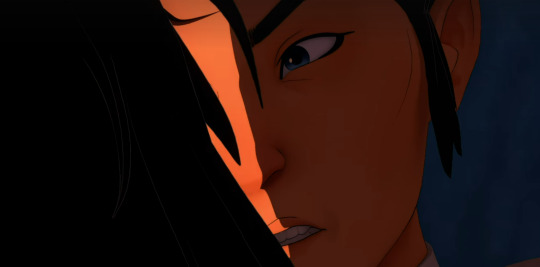

but THIS scene in the forge? warm colours. their laughter and their smiles that both equally genuine. the WAY taigen looks at mizu in that scene, staring first at her lips, her smile, then looking into her eyes. and you can see by the framing of the scene and the look on his face that he is, for the first time, seeing her eyes as something beautiful rather than off-putting or frightening.
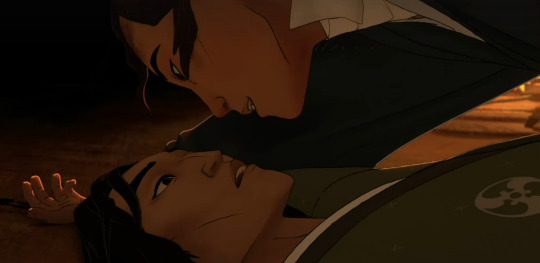
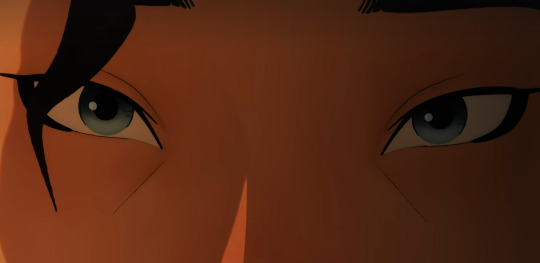
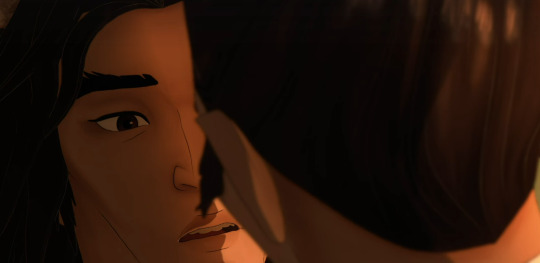
like before this point he's already come to not only respect mizu as a person and an equal but also admires her as an incredible swordsman and as someone who is kind and honourable* for having saved his life at the expense of her revenge quest. so as of the time of them tussling in the forge, taigen has already put aside his prejudices about mizu's blue eyes and no longer finds them as any cause for disgust. but in this scene he's not just indifferent about her eyes, but attracted too it.
and i'd also like to argue that his boner is not from the physical exertion or the act of wrestling itself, but from the intimacy of a playful spar, enjoying each other's easy company after having established a deep trust with each other (taigen endured torture for mizu and helped defend her from archers in the chasm while mizu saved his life from fowler's castle)
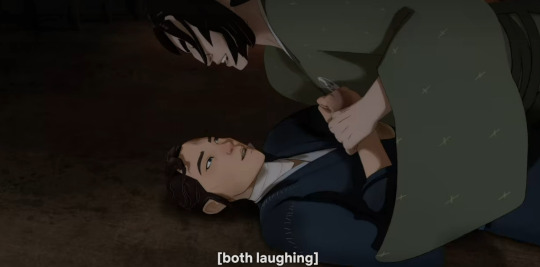
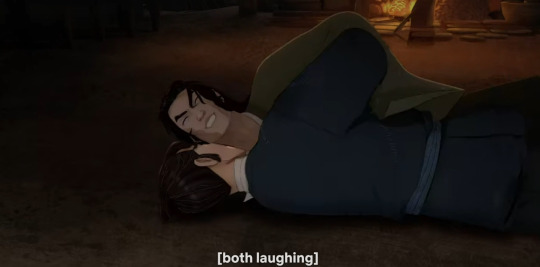
and all this while in the safety of mizu's childhood home while both of them are still recovering from near-death, amplifying their vulnerability with each other.

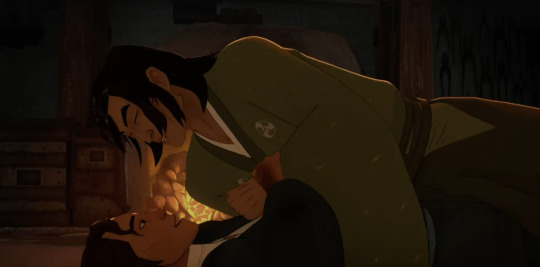

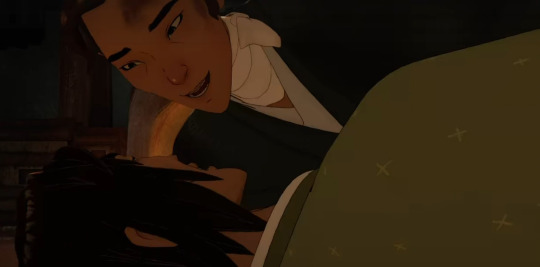
like when was the last time mizu cracked a genuine smile, let alone a laugh that's more than a little wry chuckle?? and for this to happen at such a low point in her life also speaks to the comfort this little friendly spar gives her.
because like, this is after she failed her mission to kill fowler. meanwhile her sword--the embodiment of her soul--is broken, and ringo who is her closest confidant is now angry at her and barely even looks at her. it just further lends to the inherent tenderness and intimacy in this scene. and i just. AHHHH i love them your honour....
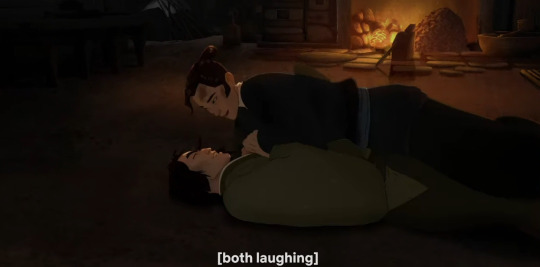
* ALSO as a side note about taigen believing mizu to be honourable: he later realises that this assumption turns out to be quite false when she reveals that she'd not only allowed akemi to be taken away against her will but also has said nothing about fowler's impending attack on edo. also i find it very interesting that out of the two revelations, taigen is less angered by mizu letting akemi being married off (he sighs angrily and marches off saying he has to go to edo to find akemi), but much more angered by mizu's refusal to save the shogun and the shogunate as a whole. this is more proof that taigen's central principles are firmly rooted in the bushido and the concept of honour that comes with that. it's why he lashes out at mizu. because he'd believed mizu to be honourable and righteous, but was proven wrong. that's not to say that taigen is in the right for calling mizu a demon, not by any means. but i just find it a very interesting part of his character and it relates to his relationship and perception of mizu
also while rewatching the episode i found this very funny they just lyin there in the cart like this 🧍🏽♂️🧍🏽♂️
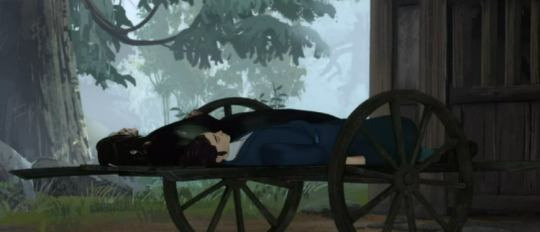
#blue eye samurai#mizu x taigen#taimizu#taizu#taigen blue eye samurai#mizu blue eye samurai#blue eye samurai meta#sorry yall but i prefer taimizu as the ship name so i'll probably just be using that from now on 🫡#also like.. the way im still recovering from covid while i have 2 deadlines back to back tomorrow and the day after#but im too busy hyperfixating on this show!!!!#if only i could channel all this energy into my actual literary studies papers that'd be great#but at the moment i be caring more about these fuckers than whatever william blake's got going on#jk i do still love william blake's poetry but my stupid ships take up way more space in my brain ykwim 🤒#anyway...#shut up haydar#meta dissertations.pdf#fandom.rtf
800 notes
·
View notes
Text
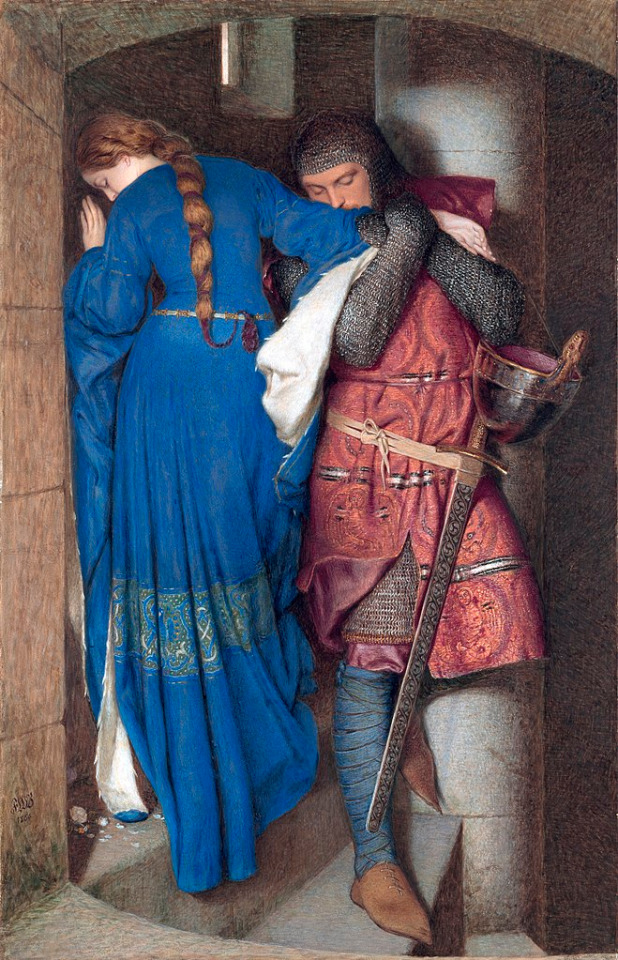
Frederic William Burton (186-1900) "The Meeting on the Turret Stairs" (1864) Watercolor and gouache on paper Located in the National Gallery of Ireland, Dublin, Ireland The painting depicts the story of Hellelil, who fell in love with her personal guard Hildebrand. The story was taken from a medieval Danish ballad translated by the painter's friend Whitley Stokes.
#paintings#art#artwork#literary painting#forbidden love#frederic william burton#watercolor#watercolour#gouache on paper#museum#art gallery#history#star crossed lovers#costume#costumes#blue dress#knight#love#stolen moments#devotion#1860s#mid 1800s#mid 19th century#aesthetic#aesthetics#longing#yearning#1k#2k
3K notes
·
View notes
Text
"this character in iwtv isn't a victim-" but YES they ARE!!!
literally everyone in this entire series is victimized, at some point, by something! that's half the point! like whether it is a system or society or individual or circumstance!
your problem is just that you're conflating victimhood with innocence, with being morally right, with being the "good" one. and your problem there is that no one in this series is innocent
#emil.txt#iwtv#interview with the vampire#don't be a clown on this post please i beg you#think for a moment#put on ur literary analysis hat plz and thank u!#don't come on this post telling me denis is innocent or a victim either we ALL saw him drive that carriage without a license in the movie
185 notes
·
View notes
Text



christa wolf, cassandra (1983)
#it can be read both ways#eddie to steve or steve to eddie#steddie#steddie literary moments#steddie au#steddie angst#steddie headcanon#steddie scene#for my steddie heart#steve harrington#eddie munson#steve x eddie#eddie x steve#steddie brainrot#fruity four#stranger things#steve harrington/eddie munson#eddie munson/steve harrington#joseph quinn#joe keery
738 notes
·
View notes
Note
So i had a thought while writing my comment for the latest chapter.
Is the fight between Red and Helsknight going to be the end of the fic? Is Martyn going to listen to Tanguish and then tell the Knight that it's his squires fault for why his blood is on the sand?
How would Red react, how would any of them react, if they killed the Champion of Hels?
Maybe Tanguish tries to bring him back, thus fully becoming a saint in his own right and separating from his hermit completely. Maybe he becomes a saint of protection and facing your fears and learning remora behavior?
Anyways really love the fic and the little side chapters we get!
🎤
#rns asks#nyxcentury#a lot of thoughts#i dont necessarily want to answer them#because i think theyre good questions to ask#i will say though: Red and Helsknight's fight is... a rising action i think#if i had to pick a literary term#there is at least one more climax planned for the fic#depending on what you would label a climactic moment there are possibly two
25 notes
·
View notes
Text
Spoilers for shadow of the erdtree, but...
I NEED to talk about Marika, okay?
In the base game, I thought she was interesting, don't get me wrong, but the amount of DEPTH SOTE gives her is INCREDIBLE.
The first time I got to the Shaman Village, I instantly knew she was going up on my Good Antagonist List™ immediately.
And, because of that, I wanted to have another ramble about her, as is becoming customary for this blog.
So, let's go over what exactly we learned about Marika and what this informs us about her character.
I think the Shaman Village really takes center stage here. The music, the item descriptions, it all combines to paint a gentler, more human image of Marika. In the base game, she was more like a god (which made sense seeing as she was one), but we see a more human side of her here.
So, the Shaman Village. It's the place where Marika grew up, her home. Unfortunately for her, shaman bodies are apparently quite good for putting into big jars, which was something the Hornsent loved to do. We've all seen it before, right? I mean, we've all seen a zealous religious society commit atrocities against an underclass in fiction, not the jar thing.
And the Hornsent are a zealous religious society. They used the bodies of shamen in jars to make saints. Which sounds like complete nonsense, I know, but that's just elden ring lore babey.
Anyway, it's my personal headcannon, if not outright fact, that the Hornsent's persecution of Marika's people is what led her down the path of becoming a god. Like Miquella, she wanted to make the world a gentler place. Unlike Miquella, though, she only wanted to make it gentler for her people.
In short, it's my belief that Marika became a god in large part to inact revenge on the hornsent.
Okay, pause. I know Elden Ring Lore is like, a big deal and all, and anything I say is basically unfounded on everything except intuition, my own personal interpretations, and because I believe my theories fit thematically within the wider narrative, but just stay with me on this, alright? I think there's a real undertone of misogyny in the fanbase, and sometimes that can color interpretations of certain characters even unintentionally. Marika has gotten this treatment worse than most, I think, because she is a prominent woman who does morally questionable things. Beyond the inherent misogyny, though, I've noticed that a lot of people interpret Marika's actions very uncharitably. Anyways, all that to say, this is my post, and I care more about everything working together thematically than digging deep into the depths of the lore to find out that "oh, actually Scrupulous the Untested mentioned this flower, which represents pure evil, and he was talking about Marika when he did," or whatever. A strawman? Perhaps, but you get my point. Still, I'll try to remain true to my understanding of the lore, but I'm bound to make mistakes. I'm not an expert. Sorry for the long aside, I just felt these were important points that wouldn't fit in elsewhere.
So, I believe Marika sought godhood partly to punish the Hornsent, although I won't pretend to understand her full motivations.
I believe this is what Ymir was referring to when he said "I fear that you have borne witness to the whole of it. The conceits - the hypocrisy - of the world built upon the Erdtree. The follies of man. Their bitter suffering. Is there no hope for redemption? The answer, sadly, is clear. There never was any hope. They were each of them defective. Unhinged, from the start. Marika herself. And the fingers that guided her. And this is what troubles me. No matter our efforts, if the roots are rotten, then we have little recourse."
My interpretation of this is that Marika's intentions for godhood were impure. She wasn't seeking to improve things, just punish the ones who wronged her people. Thus, her reign was doomed from the start.
Now, let's get into what really sold me on Marika as a character.
There are, to my knowledge, two items you can find in the Shaman Village.
The Minor Erdtree incantation, and the Golden Braid talisman. Let's take a look at the flavortext for these two items and see what we can glean, starting with the Minor Erdtree.
"Marika bathed the village of her home in gold, knowing full well that there was no one to heal."
So, by the time she returned to her village, everyone was already dead. How devastated must Marika have felt, to return from claiming godhood and revenge, only to find that there was no one left to avenge. She was alone.
Here's the text we get from the golden braid:
"A braid of golden hair, cut loose. Queen Marika's offering to the Grandmother. Boosts holy damage negation by the utmost. What was her prayer? Her wish, her confession? There is no one left to answer, and Marika never returned home again."
Man, reading that, with the shaman village music in the background, just thinking about a young Marika resolving herself to become a god, to save her village and people from the Hornsent, the anger she must have felt, the fear and solemn resignation of her goal, only to return again to find herself alone. What was her wish? What did she leave behind in her village? We'll never know, because Marika is alone. Her people are gone. In the end, she couldn't save them.
Is it really any wonder that she eventually began to doubt the very order she had founded?
But now let's talk about some other aspects of Marika's character that the dlc reveals.
Namely, her Omen sons.
Imagine how Marika must have felt, looking down at her newborns to see the very horns that had destroyed her people upon them. It's just so DAMN good, character wise. There must have been so many mixed feelings surrounding them. I wonder if she even felt any love for them at all when she saw those horns. Like, I don't know, obviously, but I imagine she felt conflicted. She didn't outright kill them, which is good, but she did leave them chained in a sewer for most of their lives, so yeah not great.
But that's what I love about her character. Elden ring, in a lot of ways, is about how victims can become victimizers. How, in pursuit of noble goals, or revenge, you can lose yourself and become just as bad or worse than the people you set out to punish. That's Marika's character. That's why she's part of the List™.
Because Marika started out as someone angry at the systems that oppressed her and sought to change them. She was the hero of the story, in the beginning. But, in pursuit of her goal, she lost herself and became a bit of a monster.
SOTE, to me, revealed that Elden Ring's story is one of complete moral grey. Everyone is working towards a cause that they believe in, including you. The ends justify the means for you, even if it means striking down a mostly innocent grieving woman, hunting your fellow tarnished, or turning on the ones who trusted you and called you a compatriot. Ranni, Miquella, Radahn, Fia, D, Godrick, Malenia, Leda, Ansbach, Thiollier, Gideon, this applies to everyone.
The same goes for Marika. In trying to punish the hornsent and build a better future for herself and her people, she lost her people and eventually succombed to her worst tendencies.
That's why St. Trina pleads with you to stop Miquella. Because to become a god is to sacrifice everything that makes you human.
Marika took that sacrife willingly, in order to punish the ones who hurt her, and in the end, that's what broke her.
I think she recognized this, and that's why she set the stage for you to become Lord. In the chance that someone might do better than her, make the world a gentler place, not for a god, not for ambition or power, not in revenge or anger, but im compassion. Whether or not that's how you choose to rule is, of course, up to you, but I like to imagine that Marika, after everything, found something to hope for again.
Okay, that's the end of my thoughts. Was any of that true to the lore? Who cares. It's how I like to interpret what we were given about Marika. If I'm wrong, then whatever. I'll still be right in my heart.
Alright, bye. Go play shadow of the erdtree, or watch someone else play it at the very least. Next time, I might talk about Miquella, or maybe Leda and her allies.
Someday I'll be brave enough to talk about Agent Black. Someday. But that would maybe turn into a full ten page essay about why Iconoclasts is so very good and I'm not sure the two people who care about what I say here are ready for that.
Okay bye.
A brief adendum to this post:
Because I was analyzing Marika from a literary perspective, focusing on the sympathetic angle SOTE added to her character, I realize I forgot something important, so let me say it now:
Marika's persecution does in no way justify her genocide of the hornsent.
That idea kind of got lost in the shuffle, but it's definitely an important aspect of her character. She's an antagonistic force in the world who has done some very awful things to further her goals, more so than any other antagonist in Elden Ring. Her tragic past only adds dimension to her character, not an excuse for the atrocities she comits.
Okay, bye again.
#elden ring dlc#elden ring#video game analysis#literary analysis#analysis#media analysis#thoughts#elden ring marika#marika the eternal#shadow of the erdtree#I could also talk about Morgott or Godrick if I feel like it#which is really how I decide which character to analyze#it's just based on what I feel like talking about at the moment#and I just beat the elden ring dlc so......#yeah expect some more scattered analysis on its characters
36 notes
·
View notes
Text
um. also the tbosas line where coriolanus thinks to himself “ohhh could tigris ever weaponize her mother’s furs the way i weaponized the compact?” and then over half a century later tigris hides rebels in her fur stashes and gives them great big fur coat disguises. I’m going to die
#tbosas#thg#tigris snow#coriolanus snow#bosas#ballad of songbirds and snakes#yeah whatever. had so many moments that I had to go put my book down and take a minute#like the literary parallels I KNOW that’s the point of this novel BUT ITS STILL DONE SO WELL#eenposting
309 notes
·
View notes
Text
“When I open them, most of the books have the smell of an earlier time leaking out between the pages - a special odor of the knowledge and emotions that for ages have been calmly resting between the covers. Breathing it in, I glance through a few pages before returning each book to its shelf.” ― Haruki Murakami, Kafka on the Shore.
#booklr#books#bookblr#fiction#book#quotes#book quotes#quotations#quote#book quote#i bloody hated this book#but did it have it's moments? Yes#haruki murakami#kafka on the shore#literary fiction#lit
55 notes
·
View notes
Text
i have inside of me a deep seated need to rant for long periods of time about insane takes on very specific media and then never write any of it down
#fuck off lou#my post#this is abt my lost year twelve lit presentation on the pied piper vs. picnic at hanging rock#as literary parallels. specifically as frontrunners in discussion about the fear of the unknown in horror media#i dont know where my script went and i technically have the video to transcribe from but My Voice Gets Me#this is also abt my whacko truman show thought experiment#im verbose af abt both these topics in the moment#but the second i sit down to write any of it out i go jesus. how do i BEGIN to explain this
16 notes
·
View notes
Text
I will never make this because it would be for an audience of one (me) but ever since reading "If we Were Villains" (story about serious drama kids in college who perform shakespeare and deal with a murder) I have been entertaining the thought of a crack fic crossover with High School Musical The Musical The Series where the staff decides they will no longer put on shakespeare after the tragic accident that happened at Thanksgiving, because Shakespeare plays would only increase the tension and drama. So they hire Ms. Jen who decides their spring play will actually be High School Musical (which exists in the 90s in this universe) and it ruins the vibe so much that everyone gives up on being dark and mysterious because they're universally pissed at Ms Jen for making them learn choreoraphed basketball dancing.
#if we were villains is actually genuinely good and has actual literary worth and pulls from shakespeare in an intelligent meaningful way#but unfortunately all i can do is comedy so this is the only fan content i have to offer :(#THE THING IS iwwv is just hsmtmts if it hsmtmts was good and also they committed crimes#they utilize the same parallel of casting choices with real life drama which I love#umm so casting: Meredith would be Sharpay Obvi. I think it would be really funny if James was cast as Ryan bc they hate eachother and would#have to pretend to be siblings working together. And I think ashley tisdale and Lucas Gabreel actually didn't get along when filming#also i love the thought of Ms Jen looking at James and going “i know what you are”#HOWEVER it would be more interesting if james was Chad to Oliver's Troy (which is really just reversing their Romeo and Juliet moment)#bc chad is like nooo don't do theater... stick with me and do basketball... but it would be Coded Subtextually#Unfortunately Wren would be typecast as Gabriella and I don't think that would cause drama bc I don't believe James actually liked her!#I think it was comp het bc she was very sweet and nonthreatening as opposed to Meredith's big flirting energy so she would be a “safe” crus#lets lean into that actually. this gives Wren a chance to have a personality (bc I enjoy this book but it is not good at fleshing out women#So oliver and Wren spend more time together and kind of talk about James a little and Wren is like yeah James is very sweet#and I like him but it feels so hard to get him to feel comfortable with me... i guess he's just closed off and doesn't talk much#we also get to see more of her personality and interests maybe she's like I relate to gabriella because I also like to Read :) feminism#and oliver is like Hmm That Is Not My Experience With Him perhaps our bond is deeper and James does like me Hm#And then Meredith can flirt with him as Sharpay and James gets pissed and in character gets very intense about how Troy can't join THEATER#that's why he's upset and sad bc sharpay represents theater and only that reason and nothing else and he isn't in love with oliver At All#Alexander can be Ryan now since James is Chad (and he's also Gay) and Filippa can be Kenzie bc they're both queer coded#Anyway at rehearsal one day Meredith and James and Oliver are having their fighting over troy moment and then Meredith stops and is like#wait guys. This musical is so freaking stupid. why are we even doing this#and their mutual frustration at their art being turned into a farce is enough to bond them together and they're like#we need to focus on our REAL enemy: ms Jen#and then they hatch a scheme and it's probably like. They dump a bucket of fake blood on her at opening night a la carrie#and then put on their own rebellious production... it still has to be a musical because i like musicals#families with children are in the audience and they're like OK FOLKS! HERE'S ROCKY HORROR PICTURE SHOW!#if we were villains#iwwv#hsmtmts#high school musical the musical the series
21 notes
·
View notes
Text
Honest to God, Communalist's turn to the dark side is still one of my favorite moments in any piece of Internet media. They finally made a friend outside of the Anti-Realists, someone who understood them in a way the other Anti-Realists never could, and then one of them shows up, stabs Moralist in the back, and starts laughing about it, like it's some sort of joke. The death of their new friend at the hands of someone they thought was a friend utterly shatters their worldview, and they lose it.
CultCom is probably one of the most unsettling characters in a series where the main cast includes a murderhobo and the embodiment of the Party from 1984, and it's entirely due to how we saw what they were like before all of this went down. It's such a drastic shift, and yet it makes sense in context. Their ideology technically didn't even change, just their view of who deserves to live in their perfect society.
And then there's the fact that you can view the entire sequence from a metaphorical perspective, and it somehow makes it worse. Darwinist represents essentially a breakdown of society, where the strong prey on the weak and powerless, and a return to the "natural" order of things. Moralist represents morality, a largely human construct that is exceptionally fragile and prone to bending, and Communalist represents pure altruism. If you frame it like that, Darwinist killing Moralist comes off as not just him killing one of the few actually decent people in the series, but as human nature triumphing over morality, as it always does and as it always will. And then this corrupts altruism and turns it into tribalism (CultCom); the basic tenets of altruism are still there, helping others and being kind, but now it only applies to us, not them. They do not deserve that help, they do not deserve that kindness, because they are not us, and that makes them dangerous.
Fuuuuck, I miss Realicide.
#grej#realicide#literary analysis#ask me about my other favorite moments#please#i really want to talk about Moon Big and how it fucked with suspension of disbelief#or the flashback to Emil's past in ssss#or how Fallen London is a perfect example of new weird#or the fact that SCP Foundation manages to create a self-perpetuating cycle of gut punches#by building off of pre-existing articles the readers are expected to be familiar with#which in turn keeps the wiki itself going#or that fucking Don Quixote SCP#or literally anything
14 notes
·
View notes
Note
Would love to hear any thoughts on the codification of the poet-persona over time? 👀
Ok so in the spirit of the ask game, I am not checking any citations on this whatsoever, but if you want those lmk (though they uh. largely do not exist for rímur-poets specifically, because only me and Hans Kuhn have ever cared).
This is going to require some context because, as established, the number of living people who know and care about medieval rímur can be counted on my two hands. Probably without thumbs. So, rímur are a poetic form that developed in 14th cen Iceland, which look kind of ballad-y, in that they often use four-line stanzas with ABAB end-rhyme, though actually the ballad tradition in Iceland is quite distinct (on which, see Vésteinn Ólason, The Ballads of Iceland). End-rhyme was very exciting for Icelandic poets because it was only previously a thing in some uncommon types of skaldic metres, but rímur (as their name suggests) have end-rhyme as a defining feature and rapidly become The dominant form of poetry in Iceland until well into the 19th cen.
There are two very distinctive things about rímur, other than their metres: 1) they almost never tell 'new' stories; almost all rímur narratives are attested earlier in other forms, usually in prose, which can sometimes lead to the fun cycle of saga -> rímur cycle -> old saga is lost, new version is written based on the rímur -> more rímur are written based on the new saga -> repeat until the heat death of the universe; 2) as the form develops, it acquires introductory stanzas known as mansöngvar, a term which elsewhere usually means 'love poetry', although that's not really what they're doing here.
Mansöngvar are verses, sometimes in a different metre to the rest of the canto they're attached to, in which the poet speaks directly to the audience. In the medieval period, they're pretty short and often don't say more than 'look, I made you some poetry', but as time goes on, they get more and more elaborate, and the character of the poet begins to develop some quite distinctive traits. What's interesting here is that rímur were (certainly in the medieval period; less certainly later on) performed aloud, presumably by the poet, so there's definitely some questions to be asked about how accurate the poets' self-descriptions are when presumably the audience could go 'you're not pining away for love, Jón Jónsson, I've met your wife!'
So anyway, these mansöngvar are often linked to the medieval German Minnesänger tradition (er. The actual German word might be slightly different because I still don't speak German despite my PhD supervisor's pointed remarks), which is more overtly love poetry and which sometimes features the poet as an abject and despised lover of some cruel lady. This is something rímur-poets from the later medieval period and onwards have an incredibly good time with. You may be familiar with the story of Þórr wrestling with Elli, the personification of old age in the form of an old woman. There are at least two medieval rímur poets who have a whole extended passage about 'oh alas, when I was young I was a terrible flirt but now I'm old and no women like me, except oh no, I am being courted by this ugly old giant lady; Elli is the only ladyfriend for me now, wah'. it's very playful, it's very fun, it's drawing on this general sense that the poets put forward that they're poetically gifted, but romantically unlucky, which is kind of a Thing for poets across a lot of European literature (and probably more broadly, but I don't know much about that), and is especially pronounced in the earlier Icelandic sagas about poets, which usually feature poets failing to win the love of their life for various reasons (sudden attack of Christianity; sudden attack of magic seals; sudden attack of Other Guy With Sword; etc). So in evoking this, rímur-poets are situating themselves in this existing Image of the Ideal Poet, but doing so in a way that ties them into the specifics of the Norse literary/mythological tradition as well. Poets are also frequently old and tired (same, bro), and a statistically improbably number of them are also blind (although that might just be two guys we know about who were really prolific; most rímur are anonymous so it's hard to say. But it is perhaps convenient that this also links them to A Great Poet of Old, namely Homer).
The other thing that rímur-poets really like to bring up in their mansöngvar is the myth of the mead of poetry, which I will not recount here except to say that Óðinn nicked it from a giant, and also that some dwarves used it to buy safe passage off a skerry once, so it's poetically termed 'ship of the dwarves' because it's the thing that brought them safely across the sea. Every single medieval mansöngur, if one exists at all, refers to this myth in some way, even if it's just by having the 'I made you some poetry' bit use a kenning for 'poetry' that references the myth.* And poets have a lot of fun with this too! Iceland's a coastal community, they know about boats, so you get these extended metaphors about poets trying to board a boat to sample the mead of poetry and finding only the dregs because other, better poets got there first. Or they will describe the process of poetic composition in terms of ship-building: 'Here I nail together Suðri's [a dwarf name] boat'; 'Norðri's ship sets out from the harbour [= I'm about to start reciting the main bit now]'; 'the fine vessel has now been wrecked on the rocks [=I'm going to stop reciting now]'. They'll also speak of poetry as smíð, which means a work of craftsmanship, usually physical craftsmanship (obviously cognate with smithing in English), and of brewing the ale of Óðinn, so they're really into metaphors of physical craft when it comes to the intellectual craft of poetry, which I think is really neat.
*kennings = poetic circumlocutions, e.g. 'snake of the belt' is a sword because swords are vaguely snake-shaped and hang from a belt. Common poetry kennings are '[drink/liquid/ale/wine/mead] of [any of Óðinn's literally dozens of names]' e.g. 'Berlingr's wine', and the aforementioned 'ship of the dwarves' - poetic Icelandic has literally dozens of words for different kinds of ships and also literally dozens of dwarf names, so you can get a long way without repeating yourself.
So all these things that I've mentioned that poets like to bring up - old age, unluckiness in love, poets as craftsmen - become more and more tropified as time goes on, which in turn leads to these imaginative and extended reworkings of the metaphor. No longer can you just say 'I'm old and no one fancies me', no, it's 'My only assignations now are with Elli, wink wink, here's a long description of our date'. So you end up with this very codified image of The Ideal Rímur-Poet as an old man,* ideally blind, ideally unmarried, incredibly self-deprecating about his poetry, and because that's how everyone else talks, it's self-reinforcing.
*there is one (1) known female rímur-poet from the medieval period, the poet of Landrés rímur, who unfortunately didn't write many mansöngur stanzas but is doing her best with the 'unlucky in love' bit, although her lover (male) seems to have died rather than ditched her, which is a novelty.
Anyway, it's cool and weird and fun and as I say, only me and Hans Kuhn care, academically speaking.
#lol 1260 words here. which is. maybe 10 minutes of actual speaking time but OH WELL#asks I have answered#if there are bits that I haven't explained well lmk. I have a warped idea of how much the average person knows about Norse literary history#because I *am* on my Stan Rogers Wife Guy kick at the moment please imagine Jón Jónsson holding a guitar#also. lol. I am extremely fucking doxxable every time I talk about rímur so if you do know my full legal name. keep that shit to yourself.#but also. go read my phd thesis. if you like the shit jokes in this post you'll love 70k of them concealed in academese
33 notes
·
View notes
Text
Thinking about the parallels between Jaden and Yuya again and going insane. I am mentally unwell about them.
Starting out loud, goofy, kind, and careless, thinking you’ll be the hero, you’re the good guy, you’ll face any bad guy to protect your loved ones, but ending up becoming the worst kind of evil they will ever face.
Being changed and warped in such a way that you will never be able to go back to being that same happy-go-lucky, carefree child you once were. Having to live with the fact that you will never be rid of the blood on your hands or the dark stain on your soul. They may smile at you and call you family, but they don’t look at you the same anymore. There’s a wariness in their eyes that wasn’t there before. They love you but they fear you.
Dragons are territorial creatures. Take away the one thing, the one person they love and cherish most in the world and they will cause hell on earth to get them back. Tunnel vision growing so strong, they end up hurting those around them, driving them away little by little. Waking up and realizing you are alone, you’ve been alone for some time now. Loving someone so emphatically and coming out the other side realizing you’ve tainted them and dragged them down with you. It is a pain like no other.
You have so much love to give but your love is poison. Your love is the killing kind, and they know it. They stick with you anyway, in the end. What else can they do? Despite the fear, the smiles that don’t reach their eyes, telling you they trust you but never turning their backs to you.
They stay because they cannot leave no matter how much they want to. You were a Sun, bright and warm, your gravity pulled them to you and you gave them life. Now you have imploded and you are a Black Hole and they cannot escape you. You wish that they could. It would be better for everyone, right?
Jaden Yuki and Yuya Sakaki. I am unw e l l
#i speak#yugioh#yugioh gx#yugioh arc v#yugioh Jaden Yuki#jaden yuki#yugioh yuya sakaki#yuya sakaki#the supreme king#yugioh the supreme king#literary parallels#tragedy#cinematic parallels#character study#of a sorts#character parallels#that moment when the protagonist becomes the antagonist#there’s a reason GX and Arc-V are my favorites#angst
34 notes
·
View notes